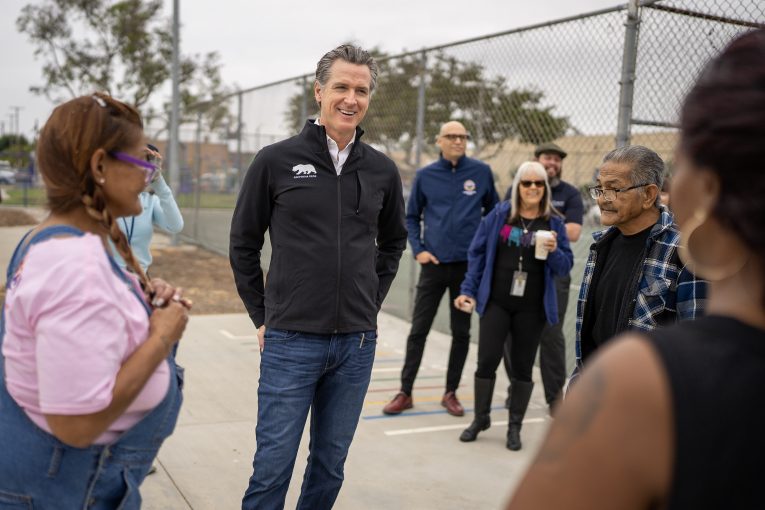

By David M. Greenwald
Executive Editor
The San Francisco Chronicle this fall noted, “Democrats like Newsom and San Francisco Mayor London Breed get perhaps the most blame for the sprawling homeless encampments on California streets.”
At the same time, “they’ve also become the most vocal advocates for clearing those encampments, including in court, setting them at odds with those who argue their encampment-clearing policies violate homeless people’s civil rights.”
This week, the Daily Journal reported, “Newsom asked the U.S. Supreme Court, dominated by Republican appointees, to reverse a July decision by the 9th Circuit that banned anti-camping ordinances because they violated the Eighth Amendment prohibition against cruel and unusual punishment for  ‘engaging in activity they cannot avoid.’”
‘engaging in activity they cannot avoid.’”
Governor Newsom has become frustrated at the court orders preventing the clearing of encampments.
“The San Francisco order, it’s preposterous and it’s inhumane,” Newsom told the Chronicle in September. “It’s incredibly frustrating.”
The Chronicle reported, “Newsom was so mad, he said he considered publicizing the judge’s contact information so residents would know why the encampment wasn’t being cleared.”
“I literally was talking about putting a big sign with the judge’s phone number saying, ‘Call the judge. We want to clean this up, too. Yes, we’re aware. Yes, we see what you see,’ ” he said.
But of course there is another side to the story.
A coalition of groups, for instance, have argued against the criminalization of homelessness in San Francisco.
Governor Newsom filed a brief in support of a request for the U.S. Supreme Court to review the Ninth Circuit’s ruling in Johnson v. City of Grants Pass.
The Lawyers Committee for Civil Rights of the San Francisco Bay Area and the ACLU of Northern California, who represent the plaintiffs in Coalition on Homelessness v. City and County of San Francisco responded, “Instead of seeking to punish people simply because they can not afford the limited housing in California, the governor, and elected officials at all levels should focus their attention on policy solutions such as building more affordable housing, providing subsidies to those who are at risk of losing their housing, and investing in holistic services.”
The Ninth Circuit, in Martin v. Boise, “determined that the government cannot arrest poor people for sitting, lying, or sleeping in public when they have no real alternative.”
But importantly, “The decision does not cover individuals who do have access to appropriate shelter or housing.”
The court determined that “the City of San Francisco routinely cites and arrests thousands of people who have no real access to shelter and regularly destroys their personal belongings. This is in violation of the City’s own policies and the U.S. Constitution.”
The court also found that “the City enforces the City’s anti-homeless laws even when there are no social services staff present to offer shelter, without knowing if any shelter is available, and even when it is obvious the City’s shelters and supportive housing sites are already at capacity.”
In their filings, “The City provided no specific evidence that it offered shelter to any of the 3,000 individuals who were cited or arrested in the past three years just for being homeless.”
The Committee argued, “This is not a ban on addressing homeless encampments. The City can enforce all necessary health, accessibility, and public safety laws [government link] to address homeless encampments when necessary–including for routine street cleanings. The City can also clear encampments if it makes real offers of available shelter to the affected people.”
As we noted last week, the LA Times notes that rulings from the 9th Circuit Court of Appeals have made it more difficult for California to clear homeless camps.
Five years ago, “the appeals court ruled it was ‘cruel and unusual punishment’ forbidden under the 8th Amendment to arrest or fine people who were sleeping on the street in Boise, Idaho, because they had nowhere else to go.”
The Times explains, “Together the rulings have created two different legal standards for dealing with homeless people and homeless encampments in this country.”
“Most local governments throughout the country can remove encampments that are blocking sidewalks and the right of way,” said Amanda Karras, general counsel of the International Municipal Lawyers Assn. But on the West Coast, the 9th Circuit rulings “create a significant amount of uncertainty for local officials over what is legally permissible” when confronting homeless encampments, she said.
The problem of course is that the governor and local jurisdictions simply want to remove the blight of people camping out without dealing with the underlying issues.
In response to the LA Times editorial from last week, a letter writer noted exactly this.
Rae Huang of Los Angeles, a senior organizer with the group Housing Now, noted that the Times acted as though “the human suffering on the streets of Los Angeles could be radically transformed if not for a ruling by the U.S. 9th Circuit Court of Appeals.”
The reality is, “No ruling by the courts, not even one by the U.S. Supreme Court, will change the fact that Los Angeles’ housing costs are out of reach for most people.”
“We are all frustrated by the street conditions,” they continue, “but instead of brutal sweeps that shuffle people like trash from one corner to the next, our leaders should focus on affordable housing and protecting tenants from eviction.”
The problem starts at the governor who wants the power to clear the streets without providing the housing and services that they need in order to do it under current law.

